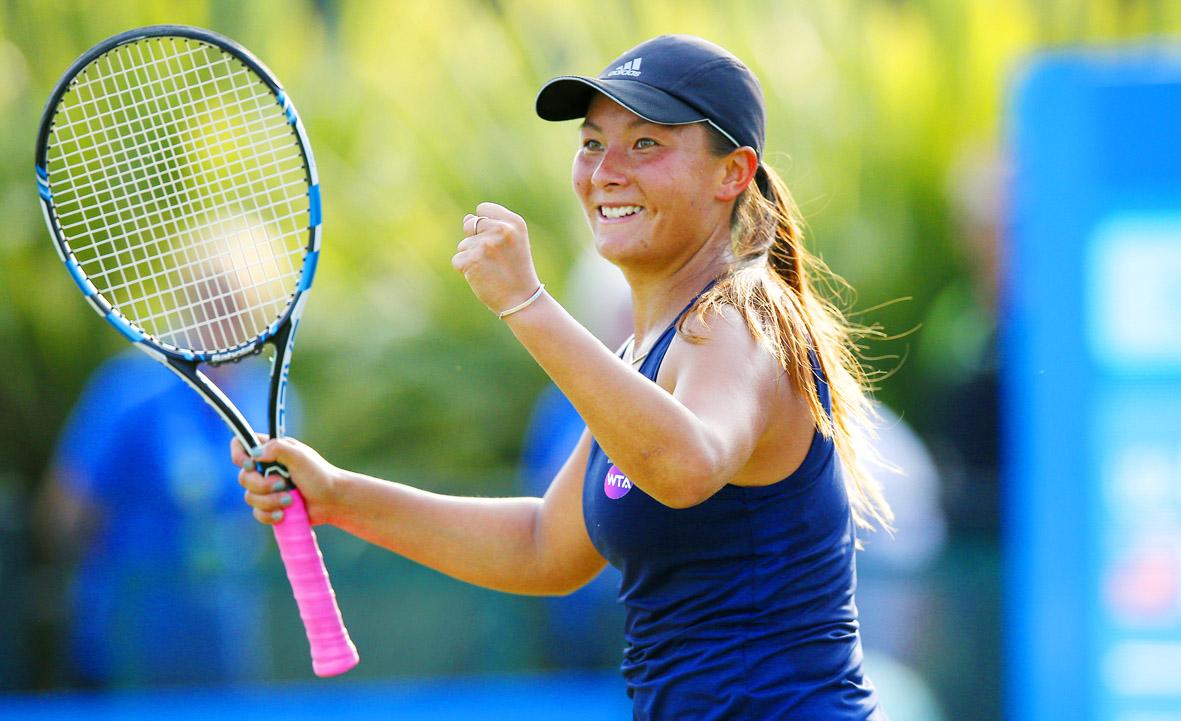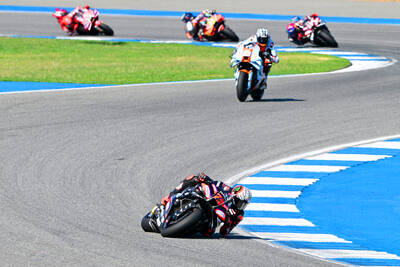With careers spent scratching around dusty outposts, sometimes with very little in their pockets, tennis’ unheralded army of foot soldiers say that they are struggling to afford food after being made unemployed by the COVID-19 pandemic.
Georgian player Sofia Shapatava is pleading with the International Tennis Federation (ITF) to dig deep and help out the hundreds of players who lost their livelihoods when the men’s and women’s tours went into a three-month lockdown.
“Players lower ranked than 250 will not be able to buy food in two-three weeks’ time,” said Shapatava, who is not optimistic that the ITF will look favorably on her plea.

Photo: Reuters
“I honestly don’t think so,” she told reporters. “They replied that their plate is full and they will come back to me as soon as they can, but after that e-mail, they did not reply with anything.”
Shapatava, the world No. 371, is a 16-year veteran of the tour.
She plays mostly secondary ITF events, a world away from the gilded Grand Slam world inhabited by multimillionaires Serena Williams, Roger Federer, Novak Djokovic and Rafael Nadal.
Shapatava has banked US$354,000 in career prize money from almost 1,500 singles and doubles matches.
Barely US$3,000 has come her way since the turn of the year after events in Andrezieux-Bouthion in France, Midland in Michigan, Nicholasville in Kentucky and the Californian venue of Rancho Sante Fe.
However, compared with many, the 31-year-old is well-off.
There are more than 1,000 players in the WTA rankings. The men’s ATP Tour has just as many.
Locked in the lowest rank of 1,283 is 27-year-old Ksenia Kolesnikova of Russia. She has officially made just US$68 this year.
Many players outside the top 100 traditionally supplement their incomes by coaching or playing in European club leagues.
However, those reliable revenue streams dried up after governments worldwide banned large gatherings to combat the spread of the coronavirus.
“I started the petition to help tennis players to be heard by ITF, after I talked to many of the people I know and about their plans for the next three months and I realized that some people won’t even be able to have food,” Shapatava wrote in her blog. “My problem is that my sport will die as it is, it will die, because players who are ranked lower then 150 in the world will not be able to play.”
The pandemic has brought all tennis to a standstill until June 8 at the earliest.
The entire claycourt season has been wiped out, with the French Open shifted to September and October instead of its traditional May and June.
Wimbledon could follow suit this week, when organizers might postpone or even cancel completely the grasscourt Grand Slam event scheduled to start on June 29.
Britain’s Tara Moore, the world No. 233, has made just US$2,500 this year, but her career earnings stand at US$473,500, boosted by lucrative wildcards into the main draw at Wimbledon.
In 2016, she made the second round at the All England Club and pocketed US$62,000.
“There are more important things like life and death, but a lot of players from smaller countries [are] unable to earn any income, unable to claim benefits as they are considered ‘self-employed,’” Moore wrote in support of Shapatava’s petition. “It will be tough for many players to survive the next couple of months.”
Former world No. 15 Alla Kudryavtseva sympathized with the plight of the current crop.
The 32-year-old Russian, who famously dumped Maria Sharapova out of Wimbledon in 2008, made more than US$3 million in her career, accrued mostly from success on the doubles court.
“I have savings, I’m not worried. What about those juniors that chose tennis as their career and are making the transition to pros? Who didn’t have a chance to save anything yet? Who potentially invested money in themselves?” she said. “They are not student loans.”
The ITF did not respond to requests for a comment.

Fenerbahce on Thursday earned a rare 2-1 win in England, but were still knocked out of the UEFA Europa League by Nottingham Forest in the playoffs. Forest entered the second leg with a healthy 3-0 lead from the opener in Istanbul — where Vitor Pereira made an impact in his first game in charge — and that proved enough to advance to the round-of-16 with a 4-2 aggregate score. The result was a boost for Forest, struggling at 17th place in the Premier League, in their return to Europe after three decades. They next face Real Betis Balompie or Kerem Akturkoglu gave Fenerbahce

The Cleveland Cavaliers on Tuesday emphatically got back to winning ways in the NBA, coasting to a 109-94 victory over the New York Knicks as their recent star signing, James Harden, scored 20 points. The Cavs took the lead barely a minute into the game with an Evan Mobley three-pointer and never gave it up in a thoroughly comfortable night for the red-hot Ohio franchise. Former NBA Most Valuable Player (MVP) Harden, who was brought in from the Los Angeles Clippers this month, has never won a championship, despite being one of the most decorated players in the league. That was a key

Soccer officials yesterday offered “full support and assistance” to the Iranian team in Australia for the AFC Women’s Asian Cup after the US and Israel launched massive attacks on their homeland. Iran’s 26-strong squad arrived on the Gold Coast days before the strikes on Saturday killed supreme leader Ayatollah Ali Khamenei, as Washington and Tel Aviv seek to topple the Islamic republic. They are due to open their tournament today against South Korea. The AFC in a statement said it “continues to closely monitor the recent developments in the Middle East during this challenging period.” “The AFC’s foremost priority remains the welfare, safety and

ROAD RASH: Marc Marquez retired after a crash, marking the first time after 88 consecutive races stretching back to 2021 that a Ducati bike failed to make the podium Marco Bezzecchi yesterday won the MotoGP season-opening grand prix in Thailand from pole position as defending world champion Marc Marquez retired late with a buckled wheel. Aprilia’s Bezzecchi led from start to finish to top the podium in Buriram, with KTM’s Pedro Acosta second and Trackhouse’s Raul Fernandez third. Ducati’s Marquez is chasing a record-equaling eighth world title this season, but he exited the race in dramatic fashion while in fourth place with five laps to go. The Spaniard, who started from second on the grid, took a corner wide, with the jolt to his bike dislodging the rear tire, badly damaging his